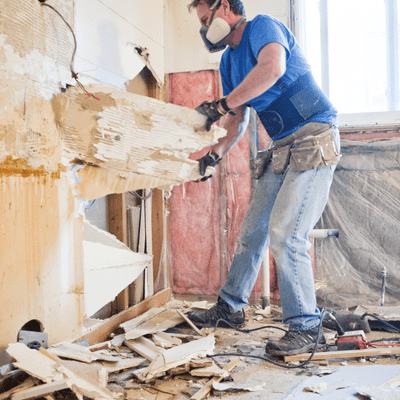If you’ve recently had a mold inspection but feel uncertain about the results or the recommendations, you’re not alone. Many homeowners find themselves questioning whether the advice they’ve received is accurate or necessary. Trusting your gut is important—your home is a big investment, and it’s natural to want reassurance.
Here’s a quick guide to help you identify when it’s worth getting a second opinion on your mold inspection and what to consider along the way.
1. Are the Recommendations Drastic for the Problem?

If your mold report suggests major repairs or a full remediation, but you’re not seeing any clear signs of mold yourself, it’s okay to feel cautious.
A recommendation for drastic work—like tearing out drywall or ripping up flooring—should match what you can actually observe. If you don’t see visible mold, smell musty odors, or notice signs of water damage, it’s worth questioning if such a big project is necessary.
- Self-Check: Take a look around your home. Do you see or smell anything unusual, or is everything in good condition? If there are no signs of mold or water damage, a second opinion can help confirm whether this extensive work is really needed. (Read more about Mold Remediation Protocol here.)
- What to Do: A second inspector can provide a fresh perspective and may suggest simpler, more targeted fixes if that’s all that’s necessary. This way, you avoid unnecessary expenses and save yourself from the stress of extensive renovations.
2. Did the Inspector Explain the Findings in Plain Language?
A clear, straightforward report is key to understanding what’s really going on. If your inspector left you with a report full of technical terms, numbers, and percentages that don’t come with clear explanations, it’s easy to feel lost. A good inspection report should be understandable, breaking down the findings in plain language.
- Self-Check: Ask yourself: Do you know exactly what the report is saying, or are you left with more questions? If the report feels like it’s missing context or explanations, it’s probably not giving you the full picture.
- What to Do: A second opinion can often make things clearer. A reputable inspector should be able to translate complex findings into plain language, helping you understand what’s going on and what the best next steps are.
3. Were You Given Specific Reasons for the Mold Growth?
A thorough inspection doesn’t just show where mold is—it explains why it’s there. Mold growth is usually tied to specific causes like leaks, humidity issues, or poor ventilation. If your report doesn’t address these factors, you may be left without a clear sense of what’s fueling the mold growth or how to prevent it from coming back.
- Self-Check: Ask yourself if the inspection uncovered any specific reasons for the mold, like a hidden leak or a ventilation problem. Without these insights, the report may not be complete, and simply knowing there’s mold present doesn’t help prevent future issues.
- What to Do: A second opinion can help you get to the root cause. An experienced inspector can pinpoint underlying issues, giving you a clearer picture of how the mold developed and, more importantly, how to prevent it from recurring.
4. Does the Inspector Also Offer Remediation Services?
Inspectors who also handle mold remediation could have a conflict of interest. If they profit from the repairs they recommend, they may be more inclined to suggest extensive remediation even if a simpler solution would do. It’s natural to feel a bit wary if you suspect the inspector might benefit financially from their own recommendations.
- Self-Check: Consider whether you feel completely confident that the inspector’s recommendations are unbiased and in your best interest. If they stand to gain financially from the remediation, it’s fair to wonder if they’re pushing for more work than is necessary.
- What to Do: To ensure an impartial perspective, consider seeking a second opinion from an inspector who doesn’t perform remediation. This way, you’ll get a clear assessment focused solely on your needs—not on what benefits the inspector.
5. Are You Being Pressured to Make Immediate, Costly Repairs?
If your inspector is urging you to take immediate action on costly repairs, it might be worth questioning why. Mold issues typically develop over time, and while they can be concerning, they rarely require emergency fixes unless they’re severe. High-pressure tactics can sometimes be a sign that you’re being pushed into costly decisions without enough time to consider other options.
- Self-Check: Ask yourself if the urgency matches the visible or reported severity of the issue. If you’re not seeing or experiencing any major issues yourself, it’s worth pausing to consider whether the immediate timeline is truly necessary.
- What to Do: If you’re feeling rushed, take a step back. A second opinion can help you assess if the issue truly requires immediate attention or if you can address it gradually, with a more thoughtful approach that better fits your budget.
6. Did the Report Leave Unanswered Questions?
After reading the report, do you feel fully informed or left with lingering questions? A good inspection report should address key concerns like the severity of the mold, its exact location, and why it’s there. If you’re left uncertain about these basics, a second opinion could provide the clarification you need.
- Self-Check: Write down any questions you still have after reading the report. Were you given a clear picture of the problem, or are you left guessing whether this is a minor issue or something more significant? If there are gaps in the information, it’s reasonable to seek out another perspective.
- What to Do: Reach out to a second inspector who can take the time to address your questions and explain the findings in full. A thorough inspector will ensure that you feel informed and empowered to make the best decision for your home.
Why Mold Inspections Can Be Tricky
Mold inspections aren’t always as simple as they seem. Low levels of mold spores are common indoors, so test results need to be interpreted with context—like your home’s materials and environment—in mind.
Common Challenges in Mold Testing
- False Positives: Materials like waterproof drywall or tile can show high moisture readings without any actual water damage. An inspector unfamiliar with these materials may misinterpret readings as mold issues.
- Humidity: High humidity, especially in certain climates or seasons, can temporarily increase mold spore counts, which may be mistaken for a more serious problem.
- Environmental Factors: Homes in humid areas or near water may naturally have higher mold levels. An experienced inspector knows to look for additional signs, like dampness or musty odors, before concluding there’s a problem.
- Sample Timing and Variability: Mold spore levels fluctuate throughout the day based on activities like cleaning, cooking, and even outdoor conditions. If samples are taken during an unusual spike, the results may not reflect normal conditions. An experienced inspector will consider timing and may suggest retesting if results seem inconsistent with visible signs.
Read more: 13 Surprising Factors That Can Trigger a False Positive
Experienced inspectors understand these factors and know how to avoid unnecessary alarms. If you’re left with doubts, a second opinion can provide a clearer, unbiased view.
Don’t Settle for Unanswered Questions. Get A Second Opinion Your Mold Inspection
If you’re noticing one or more of these signs, a second opinion may be the best step to avoid unnecessary expenses or stress. If your inspector can’t clearly answer what the mold issue is, why it’s occurring, and how to best address it, then don’t take their assessment as the full truth. An independent inspection can help you get clarity and confidence about your mold situation.
If you’re seeking an honest, impartial second opinion, reach out to Howard Environmental. We’re here to answer your questions and provide clear, practical guidance—no pressure, just the facts. Contact us today to schedule a reassessment and gain peace of mind.

